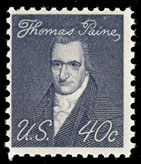Frases célebres de Thomas Paine
Fuente: Pumarega, Manuel. Frases célebres de hombres célebres. 3ª Edición. Editorial México, 1949, p. 248.
“Mi país es el Mundo y mi religión es hacer el bien.”
Fuente: Sociedad civil global: 2004/2005. Editorial Icaria Editorial, 2005. ISBN 9788474268232, p. 137.
Fuente: Los derechos del hombre, 1791
Fuente: Citado en Lococo Nicola. La ilustracion iniciada. Editorial Masonica.es, 2016.
Thomas Paine Frases y Citas
“El gobierno, en la mejor condición, es un mal necesario; y en la peor es insoportable.”
Fuente: Escandón, Rafael. Frases célebres para toda ocasión. Editorial Diana, 1982. ISBN 978-96-8131-285-5, p. 124.
Fuente: Pérez de las Heras, Mónica. El secreto de Obama. LID Editorial, 2009.
Fuente: Discurso de investidura de Barak Obama, 20 de enero de 2009. http://www.beersandpolitics.com/discursos/barack-obama/discurso-de-investidura/29
Fuente: De La crisis americana.
Fuente: Asimov, Isaac. El nacimiento de los Estados Unidos, 1763-1816. Traductor Néstor Mínguez. Alianza Editorial, S.A., 1995. ISBN 8420699683, p. 97.
Fuente: Primer número de La crisis americana, publicado el 23 de diciembre de 1776.
Thomas Paine: Frases en inglés
Part Two, Chapter III
1790s, Rights of Man, Part 2 (1792)
Part Two, Chapter III
1790s, Rights of Man, Part 2 (1792)
Part 1.3 Rights of Man
1790s, Rights of Man, Part I (1791)
The Crisis No. XIII
1770s, The American Crisis (1776–1783)
1770s, Common Sense (1776)
A long habit of not thinking a thing wrong, gives it a superficial appearance of being right, and raises at first a formidable outcry in defense of custom. Explanation: Paine explained the need to speak out against a tyrannical power, notably Britain and King George III, because not doing so could be a dangerous action on its own. A long habit of not thinking a thing wrong, gives it a superficial appearance of being right, and raises at first a formidable outcry in defense of custom. This first part actually has two sections on its own. In the first half, Paine says it’s important to note the “wrongs” that occur when injustices are clear — not doing so gives them the “appearance of being right.” In the second half, he notes that people’s first reactions to those complaints are always to side on the side of “custom” — that is, to oppose attacks against institutions.
But the tumult soon subsides. Time makes more converts than reason. Explanation: Most Americans are not in favor of impeachment at this moment. It’s a reaction against a guarded institution — and citizens are going to behave in ways that make it seem they’re against the idea, by giving a “defense of custom,” as Paine put it. It should be noted, however, that the same held true for a different president — Richard Nixon. At the onset of investigations, a majority of Americans felt it was a waste of time. As they learned more about his actions as president, the public (including a significant number of Republicans) became more supportive of his ouster.
1770s, Common Sense (1776)
Fuente: Chris Walker (September 25, 2019): A Look Back At Thomas Paine, And Why Impeachment Makes ‘Common’ Sense (Even If You Think It’s A Losing Cause) [Opinion]. In: HillReporter.com. Archived https://web.archive.org/web/20190929202745/https://hillreporter.com/a-look-back-paine-and-why-impeachment-makes-sense-even-if-you-think-its-a-losing-cause-opinion-46555 from the original https://hillreporter.com/a-look-back-paine-and-why-impeachment-makes-sense-even-if-you-think-its-a-losing-cause-opinion-46555 on September 29, 2019.
“Lead, follow, or get out of the way.”
George S. Patton: "Lead me, follow me, or get out of my way", as quoted in Pocket Patriot: Quotes from American Heroes (2005) edited by Kelly Nickell, p. 157
Misattributed
Disputed, Women, Adored and Oppressed (1775)
“Give to every other human being every right that you claim for yourself—that is my doctrine.”
Robert Green Ingersoll: "...my religion is simply this: <i>First</i>. Give to every other human being every right that you claim for yourself. <i>Second</i>..." in "The Limitations of Toleration" (The Works of Robert G. Ingersoll, vol. 7, pp. 217-260, quotation on p. 258).
Misattributed
“It is the duty of every patriot to protect his country from its government.”
Edward Abbey, "A patriot must always be ready to defend his country against his government." as written in "A Voice Crying in the Wilderness" (Vox Clamantis en Deserto): Notes from a Secret Journal (1990), ISBN 0312064888.
Misattributed
Fuente: Address And Declaration At a Select Meeting Of The Friends Of Universal Peace And Liberty https://thomaspaine.org/essays/french-revolution/address-and-declaration.html (August 20, 1791)
Earliest citation to Paine appears to be in "Freedom: A Journal of Anarchist Communism Vol. XXIV" https://books.google.com/books?id=ITYfh67DKncC&pg=RA11-PA33&lpg=RA11-PA33&dq=The+trade+of+governing+has+always+been+monopolized+by+the+most+ignorant+and+the+most+rascally+individuals+of+mankind.&source=bl&ots=8DHXw2Ix1C&sig=ACfU3U3Bk_9QoyDZh_LDcoEB83cEaDWTcQ&hl=en&sa=X&ved=2ahUKEwjp3I6MqOXxAhW2KVkFHfEsDb0Q6AEwBXoECBEQAw#v=onepage&q=The%20trade%20of%20governing%20has%20always%20been%20monopolized%20by%20the%20most%20ignorant%20and%20the%20most%20rascally%20individuals%20of%20mankind.&f=false. Not found in any of his works.
Misattributed
